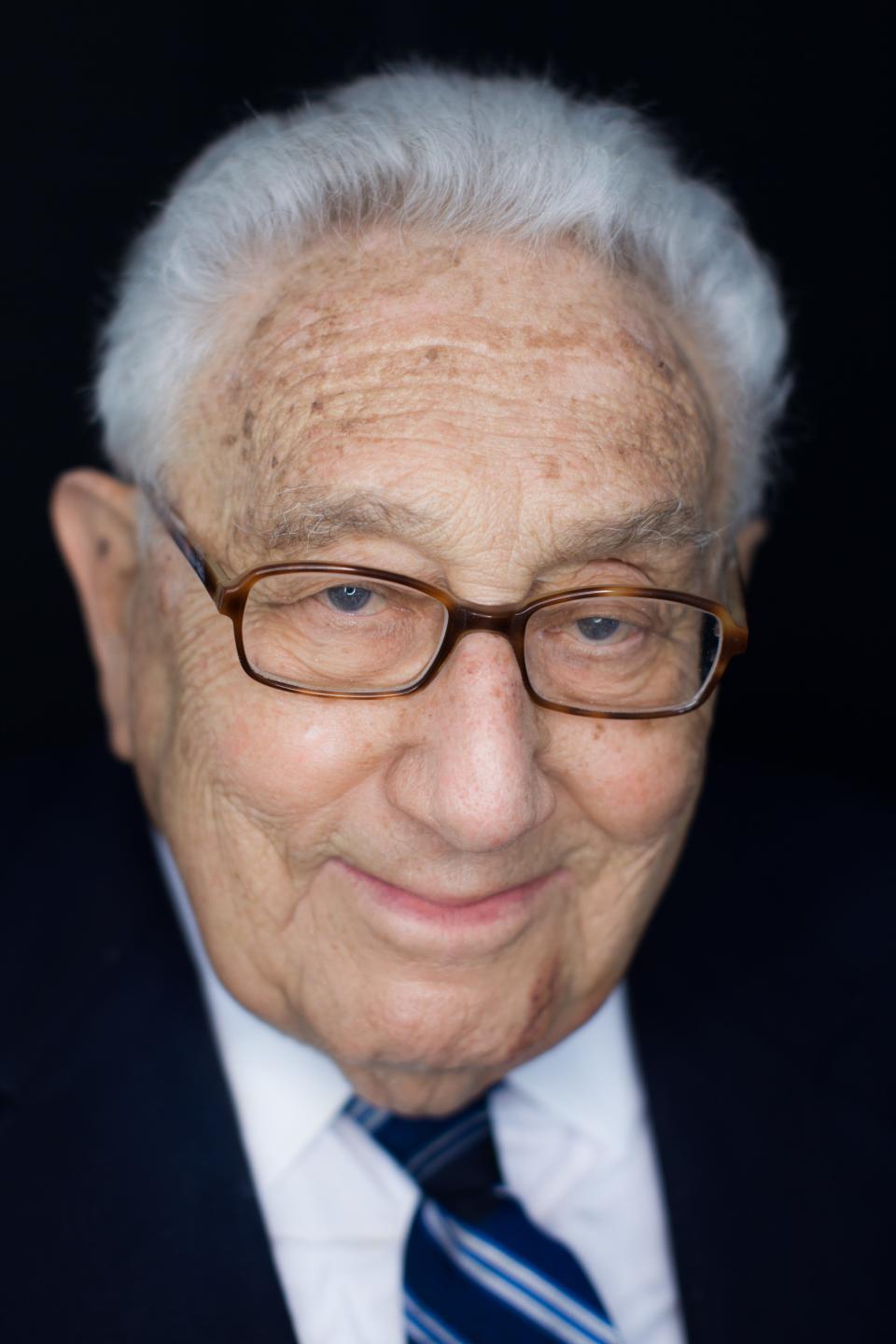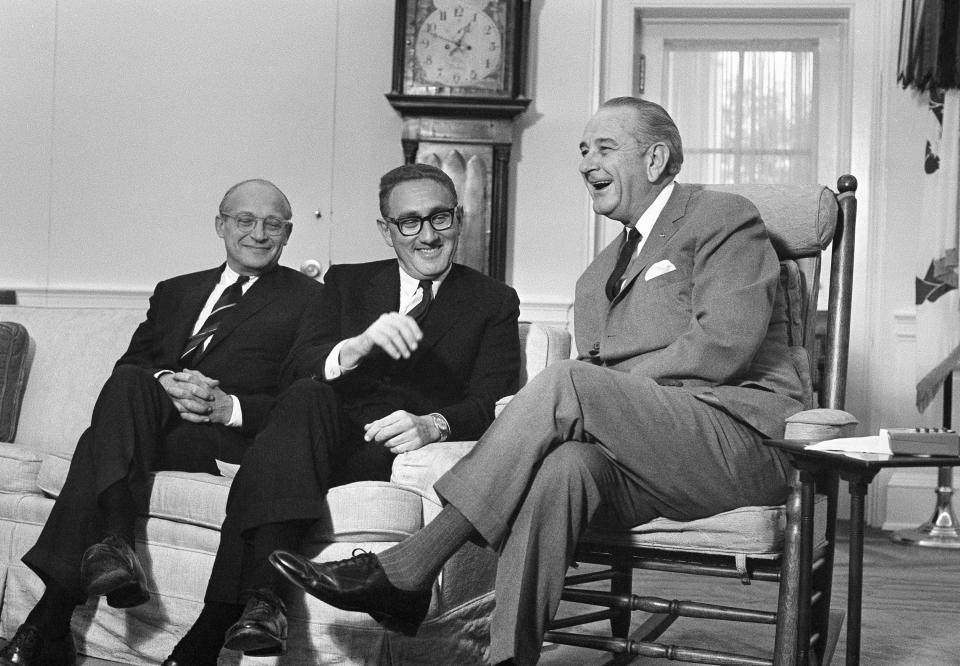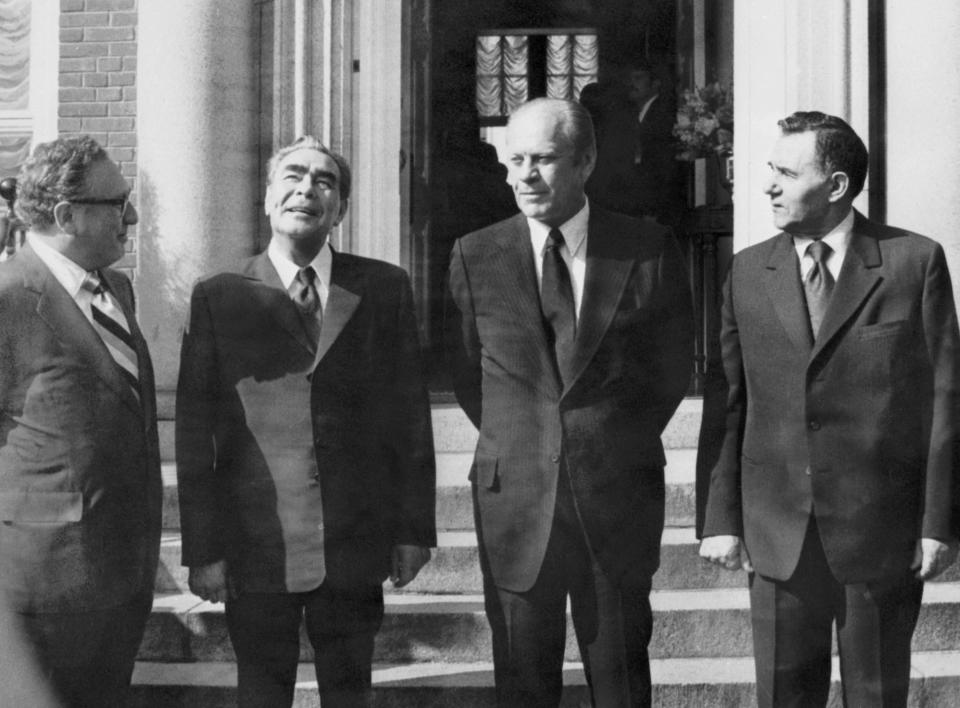Henry Kissinger, a statesman who indelibly shaped US foreign policy, dies at 100
- Oops!Something went wrong.Please try again later.
- Oops!Something went wrong.Please try again later.
- Oops!Something went wrong.Please try again later.
- Oops!Something went wrong.Please try again later.
Henry Kissinger, a German-born American diplomat who shaped U.S. foreign policy in the second half of the 20th century and won a Nobel Prize for brokering an end to the Vietnam War, has died.
His death was confirmed in a statement from his consulting firm. He was 100 years old.
Kissinger was the most celebrated U.S. statesman in modern times, helping former President Richard Nixon establish U.S. relations with China, negotiating the 1973 cease-fire with North Vietnam, reaching Cold War detente and arms agreements with the Soviet Union and conducting “shuttle diplomacy” to defuse Middle East tension.
Kissinger at the same time was an intensely controversial figure and a lightning rod for critics of Nixon’s foreign policy, particularly in conduct of the Vietnam War and its expansion into Cambodia, which was followed by the rise of the genocidal Khmer Rouge.
He was hailed as a brilliant strategic thinker, a Harvard-educated political scientist who wielded power with pragmatic conservatism, sometimes described as “realpolitik,” or hard-nosed political realism.

“He had the most strategic mind of anyone I’ve ever came across,” said Brent Scowcroft, who served as Kissinger’s deputy from 1973 to 1975 and later was national security adviser to former President Gerald Ford and former President George W. Bush. He said Kissinger could look at individual countries and issues and “mold them so somewhere down the line they’d all come together.”
“He was a realpolitician in the German sense of the term,” said Robert Dallek, whose 2007 book, "Nixon and Kissinger," chronicled the apex of Kissinger’s career, 1969 through 1974.
“He was the most influential secretary of State in modern times but not the most constructive or successful,” Dallek said in a 2007 interview. (Those accolades, he said, were more aptly bestowed on George Marshall and Dean Acheson, who created institutions such as NATO that preserved Western democracy in Europe after World War II and ultimately won the Cold War.)
Kissinger’s critics, such as the late writer Christopher Hitchens, author of "The Trial of Henry Kissinger," accused him of playing a role in the fall of Salvador Allende, the democratically elected Marxist president of Chile who was deposed and died in a military coup in 1973. Allende’s death preceded two decades of authoritarian rule in that country.
Kissinger’s critics pointed to Nixon White House tape recordings as evidence that he worked internally to delay an end to the bloody and divisive war in Vietnam until after the Republican president’s 1972 reelection, a period that saw thousands of U.S. combat deaths and civilian casualties.
Kissinger became national security adviser when Nixon took office in 1969 and in 1973 became secretary of State, after overshadowing William Rogers, Nixon’s first secretary of State, by taking the lead on important foreign policy issues. Kissinger continued in the Cabinet post under former President Gerald Ford after Nixon resigned office over the Watergate scandal.
Kissinger was an outsize figure on the public stage during the prime of his public career. An unabashed publicity hound, he dated Hollywood starlets and both courted and manipulated Washington columnists and journalists. He remained a fixture of television talk shows well into his 80s and led a successful consulting business.
Democrat and Republican presidents alike sought his counsel as they shaped foreign policy in the aftermath of the Cold War and the terrorist attacks on the United States of Sept. 11, 2001. Companies and governments paid millions of dollars to his consulting firm, Kissinger Associates, for his strategic analysis and contacts with those still in power.
Kissinger’s “influence stayed with him after he left office, while that of all the others — with the possible exception of James Baker — dissipated,” said Leslie Gelb, a former president of the Council on Foreign Relations and onetime Kissinger protege.
Kissinger came to the United States at the age of 15, an immigrant who had escaped Nazi Germany with his family.
Born Heinz Alfred Kissinger on May 27, 1923 in, the Bavarian town of Furth, he was the first son of an Orthodox Jewish schoolteacher, Louis, and Paula Stern, the daughter of a cattle trader.
With Nazism on the rise, the young Kissinger was barred from soccer matches and schools and beaten up by local toughs, according to a 1992 biography by Walter Isaacson. Kissinger’s father was fired, along with other Jewish teachers, from a state school in 1935. The family fled to New York City in 1938.
Intelligent, industrious and ambitious, Kissinger worked nights while attending high school and a year of City College, intending to become an accountant. He became a citizen in 1943 and was drafted into the U.S. Army. He moved from the infantry to military intelligence in Germany. After the war he enrolled at Harvard, where he earned undergraduate, masters and doctorate degrees in its government department, and then became a professor there.

His dissertation at Harvard drew notice in academic circles; it was ostensibly about early 19th century Europe but had parallels for containing the contemporary Soviet Union.
Gelb, a former Kissinger student and research assistant, called the dissertation, “A World Restored: Metternich, Castlereagh and the Problems of Peace 1812-22,” and a subsequent book, "Nuclear Weapons and Foreign Policy," the most important works on foreign policy in the last half-century. In them, Kissinger described his world view: pragmatic, even ruthless balance-of-power politics that gave minimal weight to moral issues such as human rights.
“If I had to choose between justice and disorder, on the one hand, and injustice and order, on the other, I would always choose the latter,” Kissinger once told a colleague, according to Dallek.
At the time, Gelb said, white Anglo-Saxon Protestants ran the State Department and rumpled Jewish professors with foreign accents were confined to academia and Hollywood movies like Dr. Strangelove, which featured a Kissinger-like German-accented character.
Kissinger’s rise was in part due to close association with Nelson Rockefeller, a millionaire adviser to former President Dwight Eisenhower who became New York governor and unsuccessful Republican presidential aspirant.
When Rockefeller lost the Republican nomination to Nixon in 1968, Kissinger shifted his allegiance to Nixon, offering confidential information about U.S. negotiations with communist North Vietnam that helped Nixon win the election, according to several historians, among them William Bundy, a former assistant secretary of State.
At that time, Kissinger was a registered Democrat who had voted for John Kennedy in 1960 and Lyndon Johnson in 1964. He had been a part-time adviser to both and had cozied up to the 1968 Democratic nominee, Hubert Humphrey, Dallek and Isaacson wrote.
Marking Kissinger’s diplomatic career:
Breakthrough with China: Nixon, who had spent much of his career bashing “Red China,” came to office determined to make a 180-degree turn in policy. He recognized the folly of snubbing a government representing a fifth of the world’s population; he also sought to gain leverage with the Soviet Union and blunt the impact of U.S. defeat in Vietnam. Kissinger was an advocate of such a shift before he met Nixon, and he made two secret diplomatic visits to China that prepared for Nixon’s historic trip to Beijing in 1972.
Détente with the Soviet Union: Nixon and Kissinger leveraged improved relations with China to reduce tensions with Moscow and conclude the first major treaty limiting U.S. and Soviet nuclear arsenals.
Mideast peacemaking: Surprised by the October 1973 war launched by Egypt and Syria against Israel, Kissinger negotiated agreements that led to the separation of Arab and Israeli forces. The negotiations increased U.S. influence with Israel and Arab countries alike, reduced the Soviet role in the Middle East and laid the groundwork for Israel’s first peace accord with an Arab state, Egypt, after the Republicans left office in 1977.
“These accomplishments were so dazzling that they took the edge off America’s strategic defeat in Indochina and reaffirmed American power in the world,” Gelb said.

Vietnam War: Kissinger shared the 1973 Nobel peace prize with North Vietnamese diplomat Le Duc Tho for the agreement that led to U.S. withdrawal, although Tho, a founder of the Communist Party in Southeast Asia, declined the prize. Two of the five members of the Nobel committee resigned in protest of the award. The North Vietnamese overran South Vietnam and overthrew the U.S.-backed government there in 1975.
Cambodia campaign: Nixon’s decision to bomb Cambodia in 1969, and invade it in 1970 in an effort to destroy Vietnamese communist sanctuaries, spread instability that led indirectly to the 1975 takeover by the genocidal Khmer Rouge, responsible for killing more than 2 million Cambodians.
Chilean coup: Transcripts of taped conservations between Nixon and Kissinger and between Kissinger and his staff revealed covert U.S. efforts to prevent the 1970 presidential election of Allende and encourage the generals who may have killed Allende and thousands of other Chileans in 1973.
Despite their close collaboration, Kissinger and Nixon had a stormy relationship. Kissinger fawned over Nixon in person but disparaged him in private, calling him a “madman,” a drunk and “the meatball mind,” Dallek wrote. Nixon in turn called Kissinger “my Jew boy” and complained that Kissinger was trying to steal the limelight.
The policies they advanced drew criticism from human rights supporters and anti-Communists who later became known as neoconservatives for their opposition to détente with the Soviet Union.
Yet Kissinger received largely laudatory press, dazzling State Department reporters who accompanied him on marathon journeys.
Bernard Gwertzman, who covered Kissinger for The New York Times, recalled a month-long Middle East trip after the 1973 war. A few minutes after takeoff from Aswan, Egypt, Joseph Sisco, a top Kissinger aide, came to the aisle of Kissinger’s Air Force Boeing 707 and announced: “Welcome aboard the Egyptian-Israeli shuttle.” Coming just as Eastern Air Lines had established the first New York-Washington air “shuttle,” the term “shuttle diplomacy” was coined.
Kissinger was as thin-skinned as he was media-savvy. He would “call us up at home to kvetch” when a story displeased him, Gwertzman said. “He would say, ‘My father was so upset with your article that he didn’t put it in his scrapbook.’”
Kissinger had a volcanic temper and sometimes abused subordinates, playing them off against each other and authorizing FBI tapping of their home phones — a practice, Isaacson wrote, that foreshadowed “formation of a secret White House unit to bug political opponents” and ultimately the Watergate break-in. Of 28 assistants hired by Kissinger in 1969, only 7 were still around two years later, Isaacson wrote. Four had resigned to protest the 1970 invasion of Cambodia.

Helmut Sonnenfeldt, also a German refugee who rose to become a top aide to Kissinger at the White House and State Department, was the Soviet and East bloc specialist on the National Security Council. Yet Kissinger delighted in cutting him — as well as the State Department — out of meetings where policy toward the Soviet Union was discussed.
“There was a degree of secrecy about what he was doing,” Sonnenfeldt said. That included back-channel talks with then Soviet ambassador Anatoly Dobrynin. “I didn’t get to see Dobrynin except at social functions,” Sonnenfeldt complained.
Because he was conspiratorial and deceitful, Kissinger thought others were too, Gelb said. Shortly after he left office, Kissinger accused Gelb of secretly blackballing him from the board of directors of the Council on Foreign Relations. In fact, Gelb had voted for him.
“He was paranoid as hell,” Gelb said.
This article originally appeared on USA TODAY: Henry Kissinger, former secretary of State, dies at 100

